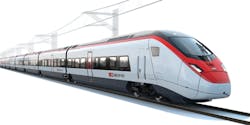Switzerland: Stadler Rail Wins Tender for NRLA Trains
SBB on May 9 awarded the contract for future international NRLA trains to Stadler Rail.
After a hotly fought tender process, the Swiss provider won the race to provide 29 EuroCity trains. This order is an important milestone for Stadler Rail, as it takes the company into the high-speed sector at up to 250 km/h. The multi-system trains will be approved for use in Switzerland, Italy, Germany and Austria. The world’s first single-decker low-floor high-speed train complies in full with the terms of the Act on the Elimination of Discrimination against People with Disabilities. The order is worth around CHF 980 million.
Peter Spuhler, owner and CEO of Stadler Rail Group, is extremely pleased, stating, “We are very proud that our proposal fulfilled the strict vehicle specifications in the best way. I would like to take this opportunity to thank SBB for the trust they have placed in us. Of course, our customer references proving our reliability and availability and those relating to the construction and approval of cross-border multi-system trains for Italy, Austria and Germany probably had a positive influence as well.”
Established trains and innovation
The newly developed EC250 is a 200-metre-long articulated train in 11 parts. The carriages are connected by what are known as Jacobs bogies. Stadler Rail was able to use many tried and tested components from existing vehicle types in the development of the train. The company also has vast experience with trains for cross-border traffic between Switzerland and Italy, with some 40 trains providing reliable service for several years. Another 18 multi-system trains have been approved for Italy and Austria. Stadler Rail is well versed in producing trains for Italy. Over 100 Stadler trains are already successfully in use in Italy.
One of Stadler Rail’s main strengths lies in product innovation. In recent years, the Swiss rail vehicle manufacturer has consistently succeeded in developing, building and successfully rolling out new products within very short timescales. For example, there were just three years between order placement and passenger service in late 2011 of the completely newly developed double-decker multiple-unit KISS trains for the Zurich commuter railway system. Stadler Rail has also proven its expertise time and again when it comes to the further development of existing vehicle series, whether it was adapting the FLIRT for the tough weather conditions in Scandinavia or producing the first 200 km/h FLIRT and KISS trains for use in Norway and Austria. All these vehicles achieved excellent availability levels within a short space of time.
